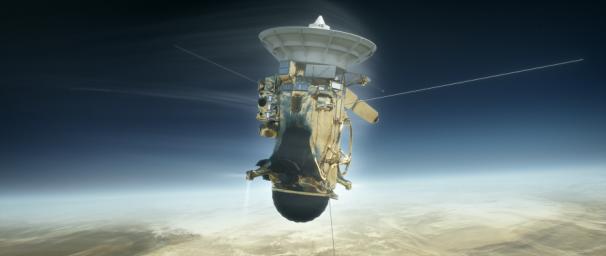
|
Cassini versus Saturn (Illustration)
- Click the image above for a larger view
- Full-Res JPEG (3000 x 1266) (221.6 kB)
- Full-Res TIFF (3000 x 1266) (9.9 MB)
Caption:
As depicted in this illustration, Cassini will plunge into Saturn's atmosphere on Sept. 15, 2017. Using its attitude control thrusters, the spacecraft will work to keep its antenna pointed at Earth while it sends its final data, including the composition of Saturn's upper atmosphere. The atmospheric torque will quickly become stronger than what the thrusters can compensate for, and after that point, Cassini will begin to tumble. When this happens, its radio connection to Earth will be severed, ending the mission. Following loss of signal, the spacecraft will burn up like a meteor in Saturn's upper atmosphere.
Background Info:
The Cassini mission is a cooperative project of NASA, ESA (the European Space Agency) and the Italian Space Agency. The Jet Propulsion Laboratory, a division of the California Institute of Technology in Pasadena, manages the mission for NASA's Science Mission Directorate, Washington.
For more information about the Cassini-Huygens mission visit http://www.nasa.gov/cassini and http://saturn.jpl.nasa.gov .
Cataloging Keywords:
| Name | Value | Additional Values |
|---|---|---|
| Target | Saturn | |
| System | Saturn | |
| Target Type | Planet | |
| Mission | Cassini-Huygens | |
| Instrument Host | ||
| Host Type | ||
| Instrument | ||
| Detector | ||
| Extra Keywords | Atmosphere, Color, Radio, Rotation | |
| Acquisition Date | ||
| Release Date | 2017-04-04 | |
| Date in Caption | ||
| Image Credit | NASA/JPL-Caltech | |
| Source | photojournal.jpl.nasa.gov/catalog/PIA21440 | |
| Identifier | PIA21440 | |
